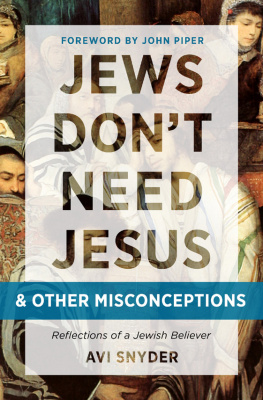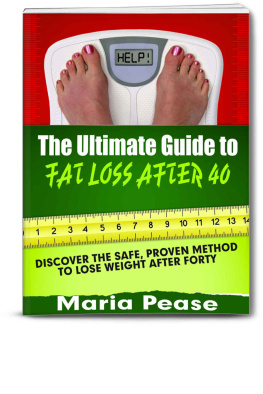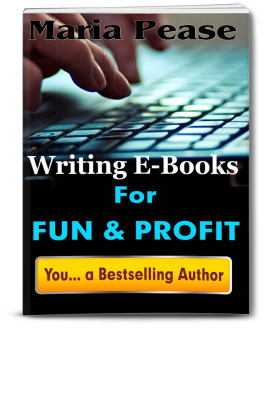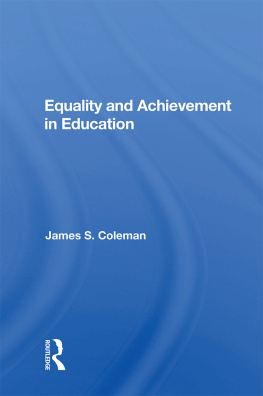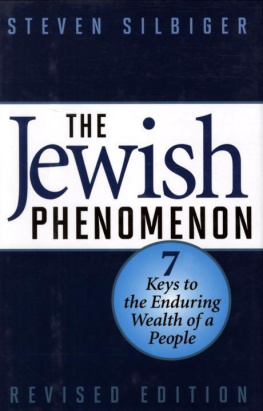The Debate over Jewish Achievement: Exploring the Nature and Nurture of Human Accomplishment
ALSO BY STEVEN L. PEASE
The Golden Age of Jewish Achievement
The Debate over Jewish Achievement:
Exploring the Nature and Nurture of Human Accomplishment
Steven L. Pease

Deucalion
Sonoma, California
CREDITS:
David Brooks July 31, 2014 article, The Character Factory is reproduced with permission of The New York Times
The exhibit was created from data provided by the Pew Charitable Trust Forum on Religion and Public Life Web site
THE DEBATE OVER JEWISH ACHIEVEMENT. Copyright 2015 Steven L. Pease. All rights reserved. No part of this book may be reproduced in any form or by any means, in any media, electronic or mechanical, including motion picture film, video, photocopy, recording, or any other information storage or retrieval system without permission in writing from the publisher. Inquiries should be addressed to: Permissions, Deucalion,
First Edition 2015
ISBN: 978-0-9825168-4-3 paperback
ISBN: 978-0-9825168-5-0 hardcover
ISBN: 978-0-9825168-6-7 kindle ebook
Design by Deborah Daly, Daly Design, deborahdaly.com
Cover art: Etz Jaim by Bernard Korzeniak, www.korzeniak.com
PRINTED IN THE UNITED STATES OF AMERICA
Contents
Preface
Jews are the worlds most disproportionate high achievers of the last 200 years or more.
That observation, while factual, seemed preposterous when I began my explorations more than ten years ago. Yet after writing The Golden Age of Jewish Achievement in 2009, speaking on the subject, being interviewed on radio and television, and soliciting criticisms and arguments to disprove the statement, I have come to believe it is simply true.
In doing the early research for that book, a question by Rabbi Harold Kushner nudged me not only to write the book that compiled the astonishing record, but also to go further. He said, Steve, if Jews are such high achievers, why do you think that is so? The effort to answer that question led me to conclusions I did not expect. I concluded that while there is no single cause, Jewish culture (some would call it cultural capital) has been the primary impetus behind the performance.
Only one chapter (of twenty-six in that earlier book) focused on my answer to Why? and I used it to describe the alternative theories and then explain why I concluded that culture is the vital force behind disproportionate Jewish achievement.
As I toured the United States speaking about the book, many were curious about who I was and why I had written it. Most were surprised to learn that a politically conservative Gentile and life-long Republican was the author. As the questions and answers unfolded, attendees came to understand my immense respect for the Jewish people, as well as my comfort in my own skin. They learned I was not aspiring to become Jewish and that I think anti-Semitism is simply nuts.
Asked why I wrote the book, I sometimes used an analogy. Had I found my way to fifteenth-century Renaissance Florence before its incredible art was widely known, few would have been surprised that as a non-Italian, I would have written about the art, the place, and the talent. The astonishing record of Jewish achievement is such a story.
There was a second reason I felt compelled to write that first bookand this book as well. Namely, in my view, encouraging human achievement is important. As a kid I could not swim in Spokane, Washingtons public swimming pools for fear of polio. Two Jews, Salk and Sabin, solved that problem with their vaccines. It was an immense human accomplishment. The prospect of death or life in an iron lung vanished. Polio vaccine is a simple illustration of how human achievement improves the lives of millions.
The Golden Age told hundreds of stories of high achievers. Their contributions to our welfare are enormous. And the philanthropy of those who became wealthy from their achievements is equally noteworthy. We need to laud and encourage more of it. This is how we make life better for everyone.
After briefly summarizing the magnitude and scope of the Golden Age performance, this book expands on the Why? hypotheses. It elaborates on the major theories raised over the years to explain disproportionate Jewish achievement, reviews new data, lays out new arguments, and explains where I finally come down and why.
Wide recognition of the importance of culture, and the need to encourage solid and positive cultural valuessuch as those that engendered The Golden Age of Jewish Achievementdeserve to be emulated. Jewish culture is unique, but its elements are not. We can learn from them.
Introduction
The Golden Age of Jewish Achievement: A Summing Up
For those who have read The Golden Age of Jewish Achievement, this material is a refresher before moving on to the newer information. And for those who havent read the book, what follows does not include all the biographical profiles that many readers found fascinating. Nor does it provide the wealth of data from the book, but it does summarize its essence in very compact form.
The Golden Age set out to be the most complete study of disproportionate Jewish achievement ever put together. It began with the question, Are Jews disproportionate high achievers? and then laid out the answer. What it reported was astonishing. I concluded this has to be the single most impressive record of disproportionate achievement by any group of people over at least the last 200 yearsand probably longer than that.
What that first book did to document their immense achievements, this one does to explore why it happened.
Why Is It Called The Golden Age?
When speaking on the subject of my first book, I typically began with two quotes. The first is by Roman Catholic and British author of A History of the Jews (1987), Paul Johnson:
Quite suddenly, around the year 1800, this ancient and highly efficient social machine for the production of intellectuals began to shift its output. Instead of pouring all of its products into the closed circuit of rabbinical studies, where they remained completely isolated from general society, it unleashed a significant and ever growing proportion of them into secular life. This was an event of shattering importance in world history.
The second was by Jewish academic Raphael Patai. His 1977 book, The Jewish Mind, became a vital source for many who read it. Patai said:
In the wake of the Enlightenment, the suddenness with which Jews began to appear and make a mark in numerous... areas... is nothing short of astounding. It seemed as if a huge reservoir of Jewish talent, hitherto dammed up behind the wall of Talmudic learning, were suddenly released to spill over into all fields of Gentile cultural activity.
These two quotes were followed by an explanation:
Jews have long been recognized for their contributions to history. Stories of Abraham, Moses, David, Solomon, Isaiah, and the numerous other prophets created and shaped early Judaism and the Jewish people. The Jewish Tanakh became Christianitys Old Testament and Jesus, Saul/Paul, Peter and the Apostles (Jews all) are the core of The New Testament, and thus Christianity. Later Islam honored Jews as the people of the Book. Muslims, Jews, and Christians share a common legacy originating with Abraham. Thus, the religious and philosophical underpinnings for half the worlds people begin with Judaism.
Next page

